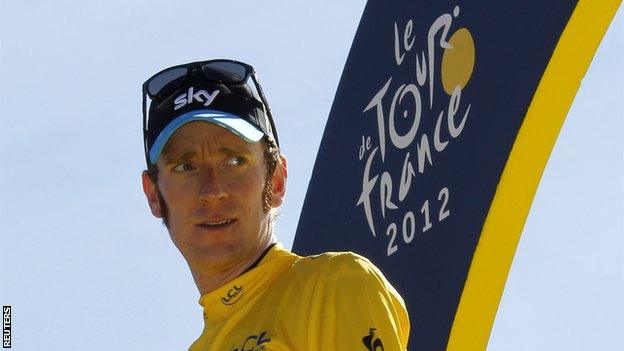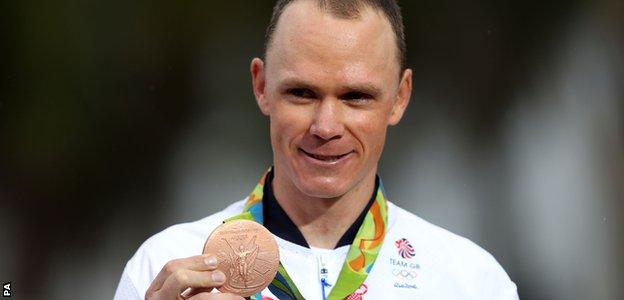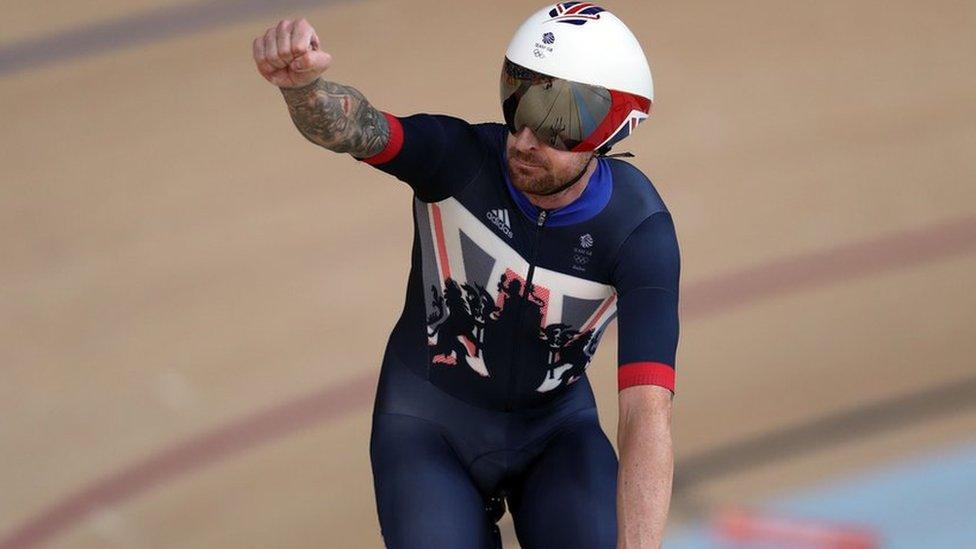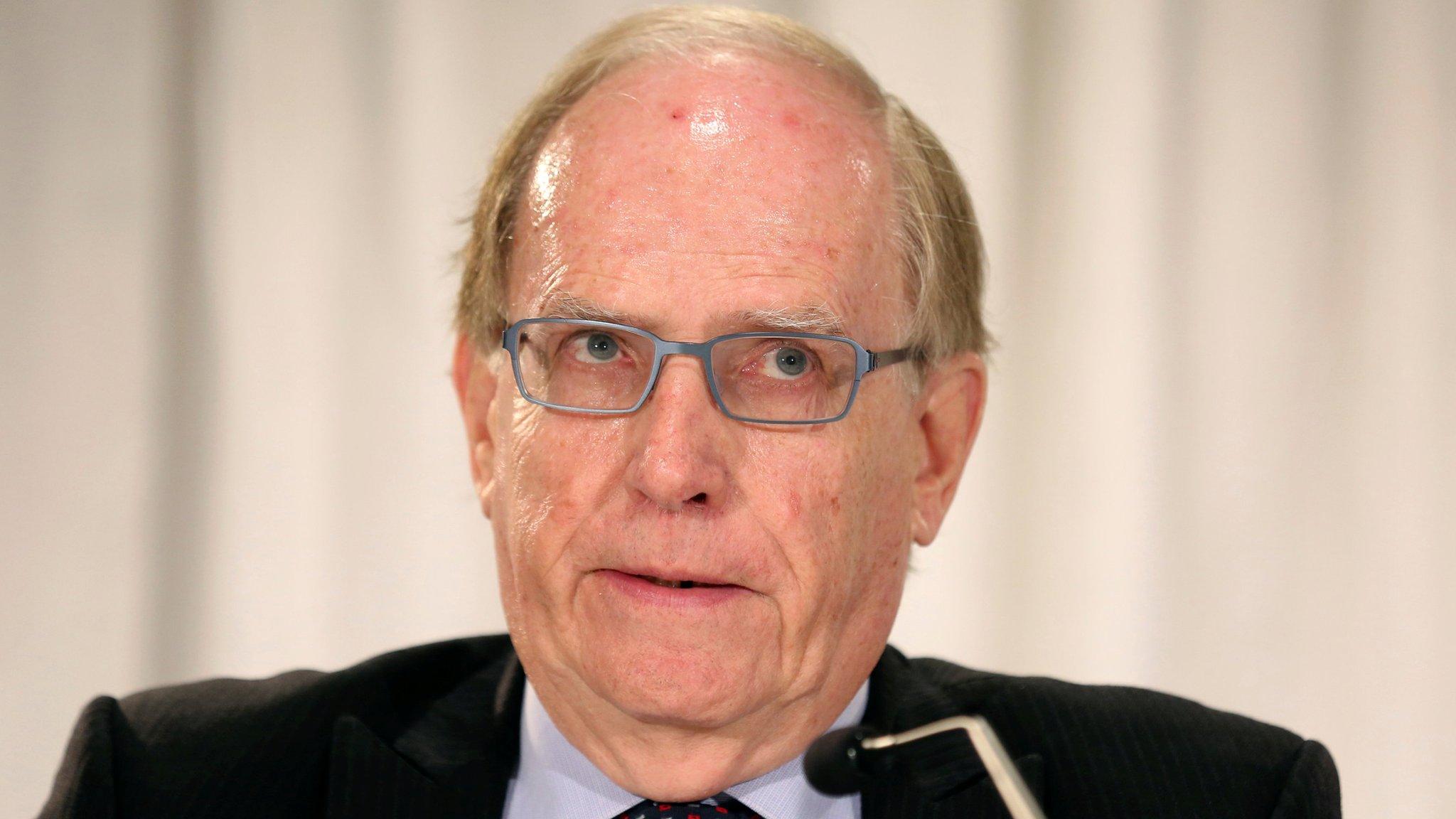Sir Bradley Wiggins defends 'no injections' claim in 2012 autobiography
- Published

Sir Bradley Wiggins released his autobiography after winning the 2012 Tour de France
Sir Bradley Wiggins has defended claims made in his 2012 autobiography that he had never received injections.
The 2012 Tour de France champion's assertion was questioned, external after leaked World Anti-Doping Agency (Wada) documents revealed he had been given three injections of allergy medication.
"Brad stands by his comment concerning the use of illegal intravenous needle injections," a spokesman said.
Wiggins' medical records were leaked by the 'Fancy Bears' hacking team.
The records show Wiggins was given permission to take two banned substances on several occasions between 2008 and 2013, prior to competitions including the 2011 and 2012 Tours de France and the 2013 Giro d'Italia.
One of the substances, triamcinolone, was taken for an allergy to pollen, according to the certificates.
It is the same drug for which disgraced American cyclist Lance Armstrong tested positive at the 1999 Tour de France.
However, Wiggins' use of the substance was legal as it was covered by a therapeutic use exemption (TUE) relating to his asthma.
Why is Wiggins defending himself?
In his 2012 book My Time, Wiggins said he had "never had an injection, apart from I've had my vaccinations, and on occasion I've been put on a drip, when I've come down with diarrhoea or something or have been severely dehydrated".
In a statement, Wiggins' spokesman said his comments in the book referred to the "historic and illegal practice of intravenous injections of performance-enhancing substances, which was the subject of a law change by [cycling's governing body] the UCI in 2011".
"The triamcinolone injection that is referred to in the Wada leaks is an intramuscular treatment for asthma and is fully approved by the sport's governing bodies."
Wiggins distances himself from Leinders

Fellow British cyclist Chris Froome also had his medical records released by hackers, along with several other members of Team GB's Rio Olympics squad
Wiggins also denied controversial Belgian doctor Geert Leinders had had any involvement in the decision to apply for TUEs before major races.
Leinders was hired by Team Sky, Wiggins' team at the time, in 2011 and worked for them on a consultancy basis until his name appeared in the United States Anti-Doping Agency's investigation into Armstrong in 2012.
Leinders was subsequently banned for life for multiple doping violations carried out when he worked for the Rabobank cycling team between 1996 and 2009.
"Brad has no direct link to Geert Leinders," the statement added. "Leinders was 'on race' doctor for Team Sky for a short period and so was occasionally present at races dealing with injuries sustained whilst racing such as colds, bruises, etc.
"Leinders had no part in Brad's TUE application; Brad's medical assessments from 2011-2015 were processed by the official Team Sky doctor, and were verified by independent specialists."
What are therapeutic use exemptions?
A TUE allows an athlete, for medical reasons, to take a prescribed substance or undergo treatment that is otherwise prohibited.
British athletes must contact their national governing body or follow UK Anti-Doping (Ukad) guidance before applying for a TUE.
There are strict criteria for one to be granted:
The athlete would suffer significant health problems without taking the substance.
It would not be significantly performance-enhancing.
There is no reasonable therapeutic alternative to its use.
The need to use it is not due to prior use without a TUE.
Ukad says it has "a number of robust controls in place to make it as difficult as possible" for athletes to misuse the system.
- Attribution
- Published15 September 2016

- Published16 September 2016

- Published15 September 2016
